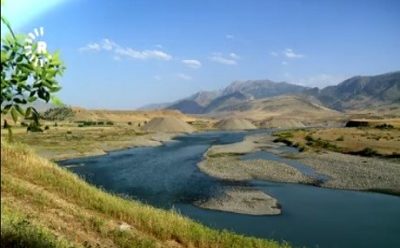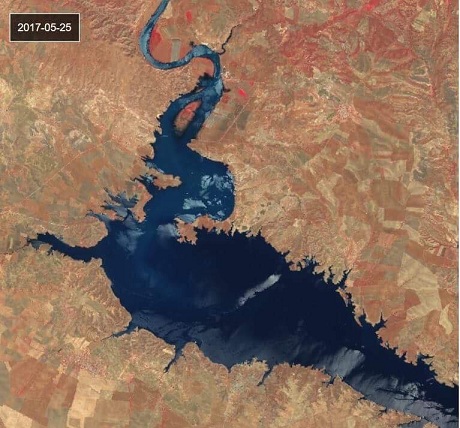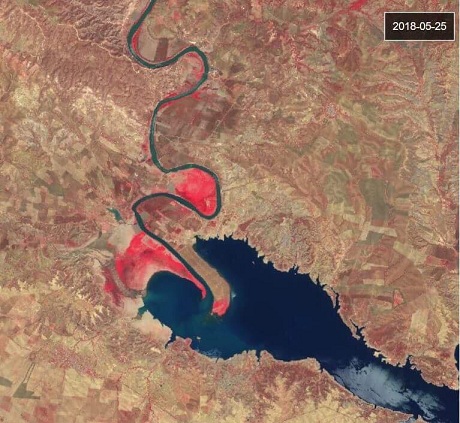Iraq’s Water Crisis Traced Upstream to Turkish, Iranian Dams

Featured image: Iran has restricted the flow of the cross-border Little Zab River. Photo: Rudaw video
The water crisis has spread in southern and central provinces of Iraq and the Kurdistan Region as dams built by Turkey and Iran, irrespective of international laws, slow the flow of rivers into Iraq to a trickle.
There are growing fears up to seven million people will be displaced due to the dramatic fall in water resources.
“Nine months ago, the Iraqi water resources ministry warned of water shortage during this summer. It called for necessary measures to be taken to tackle the issue,” Iraq’s Water Resources Minister Hassan al-Janabi told reporters on Saturday.
“The government responded to us, forming a high level committee comprising of many parties from agriculture, interior, defense, industry, electricity, housing and reconstruction and municipalities as well as the Iraqi Media Network in order to tackle the matter in question on a national level in case of water decrease,” he added.
The committee has recently met to set out a 24 point plan to address the problem, he said.
The Kurdistan Region has also fallen victim to the water crisis, as neighboring Iran has created dams on rivers flowing into its territory.
The town of Qaladze is on the brink of catastrophe after Iran restricted the flow of the cross-border Little Zab River.
“There are protocols and memorandums of understanding between Iraq and Iran concerning joint waters, but Iran has not activated its committees yet, despite plenty of meetings held between both sides regarding the mechanisms of water release,” Hassan Safar, head of the National Center for Water Resources, told Rudaw.
Iran is not committed to border water flows with Iraq, he said.
Under international law, countries that have plentiful water are not allowed to build dams on rivers flowing into neighboring countries, he said.
What Iran is doing is “contrary to the international water conventions such as Helsinki Convention and many other international conventions concerning water and rivers shared by more than one country,” Safar added.
He accused Iran of changing the direction of the Karun River so that it spills into the Shatt al-Arab and that is why “the Shatt al-Arab river has become very salty.”
Rahman Khani, head of the Darbandikhan Dam, warned the establishment of dams by Iran has caused water levels to fall at his facility.
A series of earthquakes have also hit the dam and created cracks, forcing engineers to reduce water savings, he said.
He expects “an environmental catastrophe” as the water released to Iraq in the future will be contaminated. Khani urged the Iraqi government to engage in talks with Iran.
Iran is not the only state responsible for Iraq’s water crisis.
A painful view of the Tigris near #Mosul after Turkey continues to build dams. pic.twitter.com/YDIOsvu8I7
— Shabaks of Ninewa (@ShabaksofNinewa) June 2, 2018
Turkey has recently created a concrete dam named Ilisu on the Tigris along the border of Mardin and Şırnak Provinces in Turkey. It is devoted to hydroelectric power production, flood control, and water storage.
In a Facebook post late last month, water minister Janabi warned about the dramatic reduction of water at the Mosul Dam, urging people to reduce their water consumption.
“I am always keen to inform citizens of the reality of water situation … as the ministry works to overcome the crisis,” Jaban said.
He also posted four graphic images demonstrating the impact.
“The four images below show the Lake of Mosul Dam. The first is of the dam lake on a day like today a year ago, and the second is of yesterday. Please note the clear difference between the two reservoirs, which is about three billion cubic meters.”


In his last meeting with Turkish authorities last year concerning the creation of the Ilisu dam, almost 100 kilometers from the Iraqi border, Zeyad Abdullah Saeed, manager of Duhok water directorate, said the Baghdad delegation wanted the best portion of water be released to Iraq to those Iraqi provinces situated on the Tigris River.
He said at the time the Baghdad delegation opposed a suggestion from Turkish authorities saying they would only release 60 billion cubic meters of water into Iraq. Baghdad rejected the idea, pointing out the demand of cities on the Tigris River alone is 90 billion cubic meters.
Turkey’s Ilisu dam was supposed to start restricting and saving water from June 1 after Ankara agreed to release 90 billion cubic meters of water to Iraq.
He believes the work of the Ilisu dam will not greatly impact water flows into Iraq.
Fatih Yildiz, Turkish ambassador to Iraq, tweeted on Saturday he would pass on Iraq’s growing concerns of a water scarcity caused by Turkish dams.
“I see the complaints from our Iraqi friends regarding water. I am receiving your messages. I will take all your complaints and messages to my capital not only as an ambassador. It is my duty as your friend and as someone originally from Baghdad.”
An Iraqi technical delegation will soon head to Turkey, he said, insisting his country only built the dam after consulting Iraq.
“Turkey, which considers Tigris and Euphrates waters as shared waters, will continue managing this water efficiently,” he said.
*
All images in this article are from the author.

